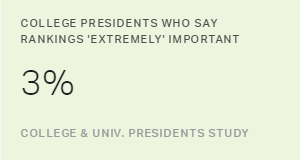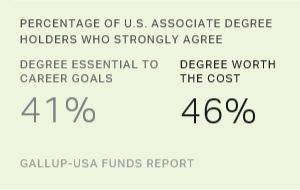A college's ranking is the least important of 16 factors for evaluating the success of a college president, according to presidents themselves. Just 3% of U.S. college presidents say university ranking scores are an "extremely important" factor.
| Extremely important | Very important | Somewhat Important | Not that important | ||||||||||||||||||||||||||||||||||||||||||||||||||||||||||||||||||||||||||||||||||||||||||||||||
|---|---|---|---|---|---|---|---|---|---|---|---|---|---|---|---|---|---|---|---|---|---|---|---|---|---|---|---|---|---|---|---|---|---|---|---|---|---|---|---|---|---|---|---|---|---|---|---|---|---|---|---|---|---|---|---|---|---|---|---|---|---|---|---|---|---|---|---|---|---|---|---|---|---|---|---|---|---|---|---|---|---|---|---|---|---|---|---|---|---|---|---|---|---|---|---|---|---|---|---|
| % | % | % | % | ||||||||||||||||||||||||||||||||||||||||||||||||||||||||||||||||||||||||||||||||||||||||||||||||
| Student enrollment | 68 | 26 | 5 | 1 | |||||||||||||||||||||||||||||||||||||||||||||||||||||||||||||||||||||||||||||||||||||||||||||||
| Ensuring graduates have the skills needed to find jobs in their chosen field | 66 | 29 | 4 | 1 | |||||||||||||||||||||||||||||||||||||||||||||||||||||||||||||||||||||||||||||||||||||||||||||||
| Student retention rates | 63 | 33 | 4 | 0 | |||||||||||||||||||||||||||||||||||||||||||||||||||||||||||||||||||||||||||||||||||||||||||||||
| Student graduation rates | 55 | 38 | 7 | <1 | |||||||||||||||||||||||||||||||||||||||||||||||||||||||||||||||||||||||||||||||||||||||||||||||
| Student engagement | 52 | 40 | 8 | <1 | |||||||||||||||||||||||||||||||||||||||||||||||||||||||||||||||||||||||||||||||||||||||||||||||
| Financial support from private donors | 45 | 37 | 13 | 3 | |||||||||||||||||||||||||||||||||||||||||||||||||||||||||||||||||||||||||||||||||||||||||||||||
| Controlling the cost of attendance | 40 | 48 | 10 | 1 | |||||||||||||||||||||||||||||||||||||||||||||||||||||||||||||||||||||||||||||||||||||||||||||||
| Job placement rates | 37 | 44 | 16 | 1 | |||||||||||||||||||||||||||||||||||||||||||||||||||||||||||||||||||||||||||||||||||||||||||||||
| Student loan default rates | 28 | 43 | 21 | 4 | |||||||||||||||||||||||||||||||||||||||||||||||||||||||||||||||||||||||||||||||||||||||||||||||
| Student diversity | 27 | 47 | 22 | 3 | |||||||||||||||||||||||||||||||||||||||||||||||||||||||||||||||||||||||||||||||||||||||||||||||
| Faculty diversity | 23 | 48 | 26 | 3 | |||||||||||||||||||||||||||||||||||||||||||||||||||||||||||||||||||||||||||||||||||||||||||||||
| Alumni engagement | 20 | 50 | 27 | 2 | |||||||||||||||||||||||||||||||||||||||||||||||||||||||||||||||||||||||||||||||||||||||||||||||
| Alumni donation levels | 19 | 39 | 34 | 7 | |||||||||||||||||||||||||||||||||||||||||||||||||||||||||||||||||||||||||||||||||||||||||||||||
| Research funding | 7 | 15 | 33 | 25 | |||||||||||||||||||||||||||||||||||||||||||||||||||||||||||||||||||||||||||||||||||||||||||||||
| The average Grade Point Average and standardized test scores of admitted students | 4 | 22 | 41 | 24 | |||||||||||||||||||||||||||||||||||||||||||||||||||||||||||||||||||||||||||||||||||||||||||||||
| Scores on college ranking lists | 3 | 14 | 40 | 36 | |||||||||||||||||||||||||||||||||||||||||||||||||||||||||||||||||||||||||||||||||||||||||||||||
| 2016 Gallup College and University Presidents Study, July 5-25, 2016 | |||||||||||||||||||||||||||||||||||||||||||||||||||||||||||||||||||||||||||||||||||||||||||||||||||
These results are based on the 2016 Gallup College and University Presidents Study. The survey was conducted July 5-25, 2016, with 663 college and university presidents in the U.S. Gallup weights the sample on key institutional characteristics to ensure it is representative of the views of college presidents nationwide.
College presidents report having other priorities for evaluating the success of an institution's chief leader. About two in three presidents describe student enrollment (68%), ensuring graduates have the skills necessary to find jobs in their field (66%) and student retention rates (63%) as "extremely important" factors in measuring success.
Smaller majorities deem graduation rates (55%) and student engagement (52%) extremely important.
Not only do presidents rate these factors as important in evaluating their success, but they also regularly track them. All presidents report that they annually monitor and discuss student enrollment (100%) and nearly all track persistence (97%), central to the retention evaluation factor presidents feel is extremely important to their success. Almost as many report that they obtain information on whether graduates have found employment and whether their employment is in the graduate's chosen field (89% and 86%, respectively).
Criticism of the rankings' impact on higher education is growing. People inside and outside of higher education are asking whether the rankings have merit or contribute to the broader and more fundamental questions surrounding higher education -- namely, is a college degree affordable and worth the cost? Given these looming core questions, it's unlikely that college rankings are useful for informing most students about what will make a successful college experience.
As a mom of one college student -- and soon to be two -- my son and I never consulted a college ranking list to help inform our college selection decisions. And the results of this study of college presidents suggest that these leaders might not steer students to consult these rankings anyway. My son was accepted into an elite university that ranks high nationally on various lists but opted to attend another out-of-state public institution that has a lower overall cost, more opportunities to do what he loves and professors who know him by name. It didn't matter to us that his college ranks lower on some of the best-known lists.
Findings from the Gallup-Purdue Index, an annual survey of thousands of U.S. college graduates, seem to support our decision. The study identified six key student experiences, referred to as the Big Six, that are linked to graduates' employment, professions, workplace engagement and well-being. Results show that caring, engaging professors and relevant work opportunities are essential college experiences linked to great jobs and great lives for graduates, helping them maximize their investment in higher education. Unfortunately, while many presidents say ensuring students have skills that translate to a job in their chosen field is extremely important (66%), many graduates report that they are not getting those experiences in school. So it appears there is still a gap between the priority of presidents and the reality for many students.
Most institutions do not track long-term employment, work engagement or other lifelong outcomes of their graduates. So the Gallup-Purdue Index findings provide unique insights as to whether campuses are delivering on their core mission, setting graduates on a course for engaged, productive and meaningful lives -- something completely absent from the metrics used in current rankings systems.
If presidents are looking for ways to enroll, retain, engage and prepare graduates for good jobs and great lives, then it is time to rethink the outcomes institutions are measuring to gauge their success. Presidents should focus on helping students learn and practice what they do best, so they can build their engagement with school today and can land in a great job and lead a purposeful, thriving life in the future. Doing some strategic asking and listening to students and graduates is a good place to start.
Presidents can track whether students have the "Big Six" experiences in school that the Gallup-Purdue Index has linked to great jobs and great lives for students. College presidents could make improvements in the areas they deem critical for success by seeing if students have strong support systems from mentors and professors, and opportunities to use their strengths in long-term projects, work-related learning experiences and school activities. The nation's chief education leaders are poised to do just that.
Helen Stubbs contributed to the content for this article, and Jeffrey M. Jones conducted the analysis for this study.




